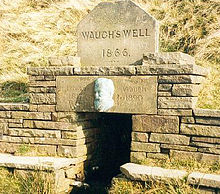Edwin Waugh (1817–1890) was an English poet.



Life
editThe son of a shoemaker, Waugh was born in Rochdale, Lancashire, England and, after some schooling, was apprenticed to a printer, Thomas Holden, at the age of 12. While still a young man he worked as a journeyman printer, travelling all over Britain, but eventually returned to his old job in Rochdale.[1]
Waugh read eagerly, and in 1847 became assistant secretary to the Lancashire Public School Association and went to work in Manchester. In Manchester he started publishing descriptions of rural rambles, and the reception of his works encouraged him to persevere. By 1860 he was able to become a full-time writer; but in 1881 he was in poor health and was granted a Civil List pension of £90 p.a.[2]
Death and legacy
editWaugh died at his home in New Brighton, Cheshire, in 1890 and was buried in St Paul's churchyard on Kersal Moor.[3] Waugh's Well was built in 1866 to commemorate him at Foe Edge Farm, on the moors above Edenfield, Rossendale where he spent much time writing. Foe Edge, was demolished by the North West Water Authority in the mid-1970s and no trace remains of the building.[4] There is a monument in Broadfield Park, Rochdale which commemorates Margaret Rebecca Lahee, Oliver Ormerod, John Trafford Clegg and Edwin Waugh.[5]
Works
editWaugh first attracted attention with sketches of Lancashire life and character in the Manchester Examiner. His first book Sketches of Lancashire Life and Localities was published in 1855 while he was working as a traveller for a Manchester printing firm.[6] He wrote also prose: Factory Folk, Besom Ben Stories, and The Chimney Corner. His Lancashire dialect songs, collected as Poems and Songs (1859), brought him local fame. He has been called "the Lancashire Burns." His most famous poem is "Come whoam to thi childer an' me", 1856.[7]
See also
editReferences
edit- ^ Hollingworth, Brian, ed. (1977) Songs of the People. Manchester: Manchester University Press; p. 155
- ^ Hollingworth (1977)
- ^ Edwin Waugh at Howling Dog Archived 2003-06-30 at archive.today Retrieved 2007-11-01
- ^ Edwin Waugh Dialect Society Archived 2008-08-20 at the Wayback Machine Retrieved 2007-12-21
- ^ "Dame of Dialect". Chetham's Library. Retrieved 12 November 2019.
- ^ Hollingworth (1977)
- ^ Hollingworth (1977)
External links
edit- Works by Edwin Waugh at Project Gutenberg
- Works by or about Edwin Waugh at the Internet Archive
- Works by Edwin Waugh at LibriVox (public domain audiobooks)
- "Archival material relating to Edwin Waugh". UK National Archives.
- Edwin Waugh at gerald-massey.org.uk
This article incorporates text from a publication now in the public domain: Cousin, John William (1910). A Short Biographical Dictionary of English Literature. London: J. M. Dent & Sons – via Wikisource.